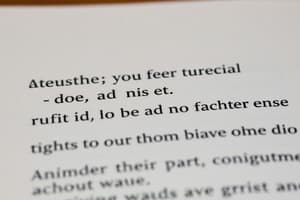Podcast
Questions and Answers
Which sentence contains an adverb of degree?
Which sentence contains an adverb of degree?
- The team played exceptionally well in the finals. (correct)
- She decided not to attend the meeting.
- He visits his grandmother weekly.
- The cat jumped off the counter quickly.
In the sentence, "Despite the heavy rain, the concert continued. ", what is the function of 'Despite the heavy rain'?
In the sentence, "Despite the heavy rain, the concert continued. ", what is the function of 'Despite the heavy rain'?
- Dependent Clause (correct)
- Independent Clause
- Predicate
- Adverbial Modifier
Identify the type of sentence: "She enjoys reading novels, but she also loves watching movies."
Identify the type of sentence: "She enjoys reading novels, but she also loves watching movies."
- Compound Sentence (correct)
- Simple Sentence
- Complex Sentence
- Compound-Complex Sentence
Which of the following sentences contains a compound predicate?
Which of the following sentences contains a compound predicate?
Which sentence demonstrates the correct use of a correlative conjunction?
Which sentence demonstrates the correct use of a correlative conjunction?
In the sentence: "Because it was raining, I took my umbrella.", identify the function of the phrase 'Because it was raining'.
In the sentence: "Because it was raining, I took my umbrella.", identify the function of the phrase 'Because it was raining'.
Which of the following sentences contains an adverb of negation?
Which of the following sentences contains an adverb of negation?
Which of the following best describes an idiom?
Which of the following best describes an idiom?
In the context of idioms, what does "hit the books" most likely mean?
In the context of idioms, what does "hit the books" most likely mean?
Which idiom describes a situation where someone needs to compensate for a mistake?
Which idiom describes a situation where someone needs to compensate for a mistake?
Select the most appropriate idiom to describe someone who is feeling anxious and jittery.
Select the most appropriate idiom to describe someone who is feeling anxious and jittery.
Which of these phrases is an example of a prepositional phrase?
Which of these phrases is an example of a prepositional phrase?
In the sentence, "The keys are under the couch," what is the prepositional phrase?
In the sentence, "The keys are under the couch," what is the prepositional phrase?
Which type of prepositional phrase is used in the following sentence: "I will meet you at the library."
Which type of prepositional phrase is used in the following sentence: "I will meet you at the library."
What is the function of prepositional phrases in a sentence?
What is the function of prepositional phrases in a sentence?
In the sentence, "The gift was sent by John," what type of prepositional relationship is demonstrated?
In the sentence, "The gift was sent by John," what type of prepositional relationship is demonstrated?
Which of the following is the primary purpose of a comparison-contrast essay?
Which of the following is the primary purpose of a comparison-contrast essay?
What should be included in the introduction of a comparison-contrast essay?
What should be included in the introduction of a comparison-contrast essay?
What is the focus of discussion in a 'point by point' organization of a comparison-contrast essay?
What is the focus of discussion in a 'point by point' organization of a comparison-contrast essay?
Which of the following is addressed during the post-writing stage of creating a comparison-contrast essay?
Which of the following is addressed during the post-writing stage of creating a comparison-contrast essay?
Which organizational structure involves discussing all features of subject A before discussing subject B?
Which organizational structure involves discussing all features of subject A before discussing subject B?
Select the best transition to use in a comparison-contrast essay to show a similarity.
Select the best transition to use in a comparison-contrast essay to show a similarity.
Flashcards
Adverb
Adverb
Modifies verbs, adjectives, or other adverbs.
Adverb of Manner
Adverb of Manner
Answers 'how' an action is performed.
Adverb of Time
Adverb of Time
Answers 'when' an action occurs.
Adverb of Place
Adverb of Place
Signup and view all the flashcards
Subject
Subject
Signup and view all the flashcards
Predicate
Predicate
Signup and view all the flashcards
Modifiers
Modifiers
Signup and view all the flashcards
Clause
Clause
Signup and view all the flashcards
Idiom
Idiom
Signup and view all the flashcards
Act up (idiom)
Act up (idiom)
Signup and view all the flashcards
Burn out (idiom)
Burn out (idiom)
Signup and view all the flashcards
On edge (idiom)
On edge (idiom)
Signup and view all the flashcards
Make up (idiom)
Make up (idiom)
Signup and view all the flashcards
Take aback (idiom)
Take aback (idiom)
Signup and view all the flashcards
Count on (idiom)
Count on (idiom)
Signup and view all the flashcards
Butter up (idiom)
Butter up (idiom)
Signup and view all the flashcards
Make up for (idiom)
Make up for (idiom)
Signup and view all the flashcards
Pin down (idiom)
Pin down (idiom)
Signup and view all the flashcards
Phrase
Phrase
Signup and view all the flashcards
Preposition
Preposition
Signup and view all the flashcards
Prepositional Phrase
Prepositional Phrase
Signup and view all the flashcards
Comparing
Comparing
Signup and view all the flashcards
Contrasting
Contrasting
Signup and view all the flashcards
Study Notes
- Adverbs modify adjectives, verbs, or other adverbs.
Types of Adverbs:
- Adverbs of Manner answer "how" an action is performed (e.g., The man walked slowly).
- Adverbs of Time answer "when" (e.g., I will call tomorrow).
- Adverbs of Place answer "where" (e.g., Marie is playing outside).
- Adverbs of Frequency answer "how often" (e.g., I buy coffee regularly).
- Adverbs of Degree answer "how much" or "to what extent" (e.g., Mathilde is very happy at the ball).
- Adverbs of Negation form negative statements (e.g., Jules is not happy with the report).
Sentence Structure:
- The subject, a noun or pronoun, performs the verb's action.
- The predicate describes what the subject is doing.
- Modifiers are descriptive words (adjectives/adverbs) that enhance the sentence.
- For example: The bright yellow fish swims swiftly and beautifully.
Clauses:
- A clause is a word group containing a subject and a predicate, often using conjunctions or conjunctive adverbs.
- Independent clauses (IC) are complete and can stand alone.
- Dependent clauses (DC) are incomplete and cannot stand alone.
- Example: When he started speaking, everyone listened, "when he started speaking" is DC, and "everyone listened" is IC
- Simple Sentence: IC = Subject + Verb; it has one subject and predicate, with possibilities for compound subjects and predicates.
- Compound Sentence: IC + IC, connected by coordinating/correlative conjunctions or conjunctive adverbs, and uses two or more subject and predicate.
- Coordinating conjunctions: FANBOYS (for, and, nor, but, or, yet, so).
- Correlative conjunctions: either… or, neither… nor, both… and, not only… but also.
- Conjunctive adverbs: also, however, hence, thus, likewise, otherwise, etc.
- Complex Sentence: IC + DC, where dependent clauses are introduced by subordinating conjunctions.
- Subordinating conjunctions include when, because, unless, though, until, etc., indicating time, cause, condition, contrast, purpose, or comparison.
Idioms:
- An idiom is a phrase with a non-literal meaning specific to a group or culture, and can add creativity to language.
Classifications of Idioms:
- Physical States:
- "Act up" means causing bodily discomfort.
- "Burn out" means being unable to perform well.
- "On edge" means nervous and jittery.
- Emotional States:
- "Make up" means restoring affectionate relations.
- "Take aback" means to surprise and shock.
- "Count on" means trusting someone for something.
- Human Relations:
- "Butter up" means to flatter.
- "Make up for" means to compensate.
- "On call" means standing by to help when needed.
- Organizing Facts and Ideas:
- "Pin down" means to define or identify exactly.
- "Run through" means another look.
- "Sort out" means organize.
- More examples:
- Great mood means feeling happy or in a positive emotional state.
- Nailed it means did something very well or successfully, especially after effort or challenge.
- Crush it means To perform extremely well or succeed at something.
- Hit the books means To study, especially in preparation for an exam.
- Pull it off means to succeed in something difficult or challenging.
- Stay focused means to keep your attention on the task at hand without getting distracted.
- Stress you out means to make you feel anxious or overwhelmed.
- Huge means very big or significant; can mean very successful or popular.
- Talk of the town means something or someone that everyone is talking about or widely discussed.
- Down means willing to do something; ready to participate.
- Blast means a lot of fun or enjoyment.
Prepositional Phrases:
- A phrase is a word group functioning as a single unit.
- A preposition links one word to another in a sentence.
- A prepositional phrase contains a preposition, its object, and any modifiers.
- They show relationships of time, place, direction, agents and things, instruments, possession, and manner; they act as modifiers.
Types of Prepositions:
- Prepositions for time: on, at, in, for, to, since, before, until, after, by (e.g., I need to submit my assignment before 5 PM; "before 5 PM" is the prepositional phrase).
- Prepositions for place and direction: on, at, in, by, between, through, among, over, under, in front of, toward, behind, before, from, above, below, out, inside, outside (e.g., My friend sent me a letter from Korea; "from Korea" is the prepositional phrase).
- Prepositions for agents and things (causal relationships): by, with, for, about, because, of (e.g., The book was written about the Philippine history; "about the Philippine History" is the prepositional phrase).
- Prepositions for instruments: with, through, on, by (e.g., My father managed to tighten the screw with a screwdriver; "with a screwdriver" is the prepositional phrase).
- Prepositions for possession: of, with (e.g., Avi owns the phone with a bow wallpaper; "with a bow wallpaper" is the prepositional phrase).
- Prepositions for manner: like, by, with, in (e.g., The group walked the red carpet with pride; "with pride" is the prepositional phrase).
Comparison-Contrast Essay:
- Comparing identifies the similarities between two things.
- Contrasting identifies the differences between two things.
- A comparison-contrast essay explores both similarities and differences to shed light on subtle aspects.
Essay Structure:
- Pre-writing: Select a good topic, list similarities and differences.
- Writing: The introduction includes a hook (statistics, quotes, anecdotes, questions), background information, and a thesis statement.
- The thesis should identify the points of comparison and contrast.
- The body consists of 2-3 paragraphs.
- Organization:
- Point by point: compares one aspect/feature at a time.
- Subject by subject/Block pattern: discusses one topic at a time.
- The body paragraphs should have facts and examples.
- Use transition words to establish similarities and differences.
- Conclusion: summarize the discussion and provide closure.
- Post-writing: Edit for weak arguments, incorrect information, or faulty reasoning; proofread for grammar errors.
Studying That Suits You
Use AI to generate personalized quizzes and flashcards to suit your learning preferences.
Description
Explore adverbs: manner, time, place, frequency, degree, and negation. Learn about sentence structure including subjects, predicates, and modifiers. Understand clauses and their role in forming complex sentences.




